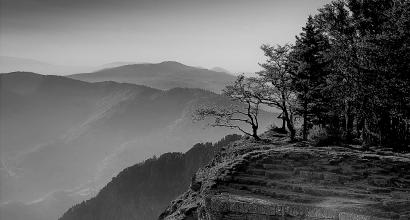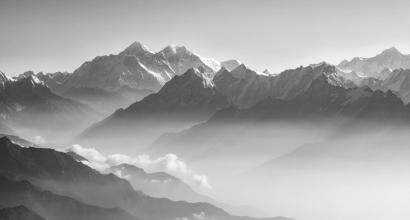Principle is more important than practice
Whatever be the turmoil due to changing times, we should remember that it is related to our outer life and that it does not need to disturb our inner life. The admixture of the jātis, the mess in the choice of occupations, and the freedom of women to work - are all restricted to external practice. It does not impact internal reality. The principle of reality cannot be annulled or modified. That is why it is known as sanātana-dharma - the dharma eternal. Truth, purity, restraining the inner and outer organs, knowledge, penance, compassion towards all beings, empathy with the world, seeing the world as one’s self, the perspective based on the principle of reality, and being established in the divine - none of these erode with the passage of time. Whatever be the jāti, whatever be the occupation, whether it be a man or woman with any set of external circumstances, however external practice might change - whoever practices truthfulness, purity, the restraint of inner and outer senses, and devotion towards the divine, is a true votary of the Gītā. Lapses in external practice need not be lamented. The principle is more important to us. The thesis is that one can tune one’s practice and behaviour as much as possible as long as it does not damage adherence to the supreme principle. One should not impede scientific progress or achieving wealth or social progress citing traditional practice as a reason. Our attempt should be to reconcile the spiritual and worldly practices into a mutually beneficial harmony. Even if there are sea changes to means of life and social circumstances, if these four principles - the preeminence of the inner self, acceptance of Īśvara’s omnipotence, śraddhā in dharma and limiting one’s selfishness - are protected, we can easily claim that the message of the Gītā will thrive. Whether one lives in America or Russia, working as a clerk or a factory labourer or a pilot, as long as life is lived with a constant reminiscence of the following - the self, Īśvara, dharma, and a restraint for pleasure - it will be impossible for such a person to commit a misdeed. Whatever such a person performs will be auspicious. The same has been expressed well by śrī śaṅkara in this verse:
yogarato vā bhogarato vā saṅgarato vā saṅgavihīnaḥ
yasya brahmaṇi ramate cittaṃ nandati nandati nandatyeva(Engrossed in yoga, or engaged in pleasure
Amidst garrulous company or totally devoid of it.
He, whose mind revels in Brahma
Rejoices,rejoices, rejoices ever!)·Moha Mudgara
Great is the constant remembrance of Brahma.
pūrṇakalyāṇarūpitvāt nityakalyāṇasaṃśrayāt |
smartṝṇāṃ varadatvācca brahma tanmaṅgalaṃ viduḥ ||(As It is of the form of complete auspiciousness, the abode of eternal auspiciousness,
And being the giver of boons to those who remember him, Brahma is known as auspicious.)
Human effort is the redeemer
There is a special word that has to be mentioned at the end. It is about the Gītā’s instruction of the primacy of human effort. In our age, with the ups and downs of the world, and the fickle and crooked human nature agitating us, it is easy for common people to quickly become disenchanted with life. We think of abandoning this saṃsāra and escaping to some other place. People, home, business, or sermons - all of these begin to disgust us. A hapless man in hardship writes thus in a personal letter to his friend:
“News of war, the neighbours’ moral turpitude, rising prices of food items, injustice from the government - have all made me disgusted. I just want to leave all this and go elsewhere. But where can I go?”
What should the answer be? Old timers would advise - “Let the world go to hell. Don’t pay heed to it. After completing your daily business - a shop or an office, go to a temple or a maṭha. Perform pradakṣiṇa. Listen to the purāṇas. Write the name of Rāma a crore times. Don’t take the world’s turmoil to heart”. I do not think that this advice reflects the teaching of the Gītā. The Gītācārya is not one to counsel abandonment and cowardly escape. What is the advice of the Gītā?
māmanusmara yudhya ca || (8-2)
tato yuddhāya yujyasva || (2-38)
tasmādyuddhyasva bhārata || (2-18)
The advice that battle is your duty - that it is only battle that is your duty - that battle is your only duty - is not just found in a couple of places as shown above, but in several places across the Gītā. It is not wise to claim - “Was not this instruction for a kṣatriya? But we are not kṣatriyas!” If a kṣatriya fought with weapons and missiles, a brāhmaṇa can also to fight with their strengths of penance, knowledge, and discernment like Vasiṣṭha, Droṇa and Cāṇakya. A kṣatriya fights his battle with his body; a brāhmaṇa with his intellect and mind. What is the meaning of war? War is breaking whatever opposes jīva and jīvana (life), and whatever obstructs truth and justice. It was not just Yudhiṣṭhira, Bhīma and other kṣatriyas who fought to break Duryodhana’s injustice but also brāhmaṇas like Vyāsa, Kṛpa, and Droṇa as well as non-brāhmaṇas like Yuyutsu and Vidura. If kṣatriyas fought with their arms, others fought using their minds and intellects. The gist is this - untruth, wickedness, ignorance, error, confusion and anarchy have to be opposed and fought wherever they are found in the world. One should not, out of fear of their rivals’ strength, run away from them. If we run away, it is tantamount to accepting those evils. A common proverb illustrates our lacuna - “Run away when you see bad people”. Such is our advice. When I was a young boy, I was taught this verse.
tera kaṇḍarè tolagu māraidan-ā-kṣaṇave
vāruvake dūra sari nūraidu māru |
vāraṇakè nīṃ sāru mūru sāviravannu
ūra biḍu durjanara seradiru sakhane!When you see a chariot, step away five yards.
When you see a horse, step away by a hundred and five.
If it is an elephant, move away three thousand!
Leave the village, but don’t mingle with the wicked. O friend!”
This might be a clever way to protect oneself but is not the way of the brave and the wise. It is beyond debate that one’s life has to be protected. Self-protection is the foremost duty. But from what perspective does it become a duty? For what has this become a duty? Is it just for living or does life have another goal? If we agree that the jīva has a supreme goal, then we have to accept that our self-preservation is for that higher goal. To attain that supreme goal, the ideal of duty should merge with various schemes for self-preservation. Forsaking duty for self-preservation is not just cowardice but also ignorance. Running away from one’s own duty, either because of danger or fear of effort, to meditate upon Rāma is not conducive for one’s own welfare!
duḥkhamityeva yatkarma kāyakleśabhayāt tyajet |
sa kṛtvā rājasaṃ tyāgaṃ naiva tyāgaphalaṃ labhet ||18-8 ||
Human effort is the hallmark of sāttvika behaviour. Concerns like - “What good will come of opposing injustice and immorality?” are in direct opposition to the advice of the Gītā. “Success or failure, winning or losing, profit or loss - be they as the divine intends; fighting is my duty.” Such is the statement of a wise person. The celebrated poet Milton agrees:
“I cannot praise a fugitive and cloistered virtue, unexercised and unbreathed,
that never sallies out and seeks her adversary.”klaibyaṃ mā sma gamaḥ pārtha naitattvayyupapadyate |
kṣudraṃ hṛdayadaurbalyaṃ tyaktvottiṣṭha parantapa || 2-3 ||
The above advice is as relevant and necessary to us now as it was for Arjuna then. Democracy is governance through problems and struggles; a conflict between a thousand greedy armies. It is a veritable daily battlefield. If life has to become tolerable for those living in it, the sāttvika people among us have to become vigorously active. “Why politics for the likes of us? Why should we bother about the government? Why should we antagonise the powerful?” - if people of similar thought preponderate in a democracy, how can such a democracy flourish? Hence -
tasmāt sarveṣu kāleṣu māmanusmara yudhya ca || BG 8.7) ||
is our redeeming mantra. It is vigorous human effort that liberates. Devoted constant effort in the face of all difficulties and contingencies; effort sans faintheartedness; effort with tranquillity - such is the effort that liberates.
How should the votaries of the Gītā react to modern civilisation?
1. Indifference?
2. Opposition?
3. Imitation?
4. Co-existence with discernment?
It will not do to be indifferent. Foreigners from Europe and America did not come here upon our invitation. We did not stop them when they came. We have accepted co-existence with them for hundreds of years. Even if we want to send them back, many of our own people might not accept it. It is impossible to say no to foreign contact. Even if possible, it is not wise to do so.
To be continued...
The present series is a modern English translation of DVG’s Kendra Sahitya Akademi Award-winning work, Bhagavad-gītā-tātparya or Jīvana-dharma-yoga. The translators wish to express their thanks to Śatāvadhāni R Ganesh for his valuable feedback and to Hari Ravikumar for his astute edits.











































